Reflective Practice in Health and Social Care: A Report
VerifiedAdded on 2021/02/21
|12
|3374
|283
Report
AI Summary
This report delves into the concept of reflective practice within the health and social care sectors, emphasizing its significance for professional and personal development. It defines reflection, outlines its purposes and benefits, and highlights its importance in adopting and applying reflective practices. The report examines the impact of reflective practice on both individual development and service users, while also discussing the negative consequences of poor practices. It introduces reflective tools and models, specifically focusing on Gibbs' Reflective Cycle, to illustrate practical applications. The analysis includes a case study involving a health visitor's experience with an obese child, demonstrating the practical implementation of reflective techniques to improve care and outcomes. The report concludes by summarizing the key findings and reinforcing the value of continuous self-assessment and learning in health and social care settings.
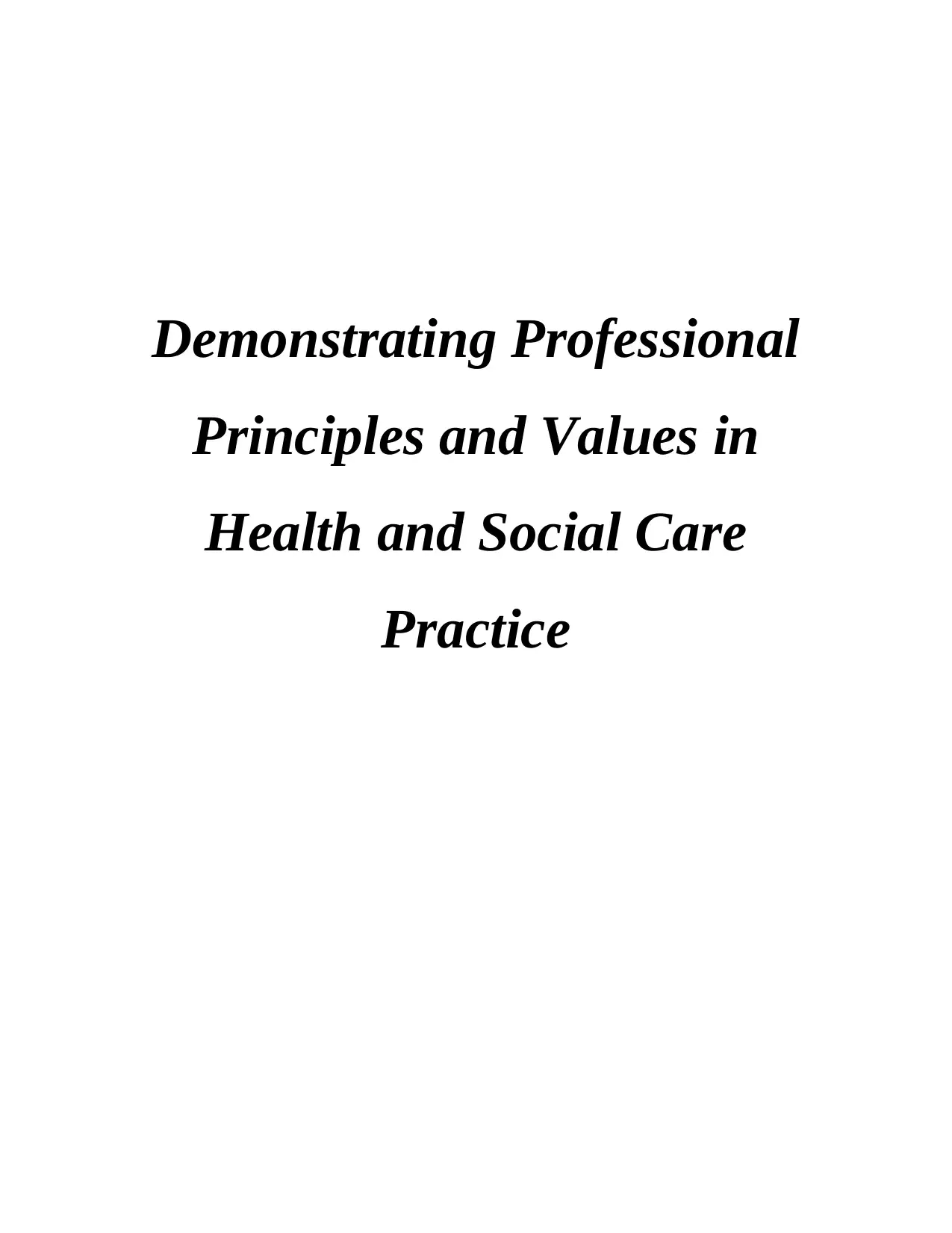
Demonstrating Professional
Principles and Values in
Health and Social Care
Practice
Principles and Values in
Health and Social Care
Practice
Paraphrase This Document
Need a fresh take? Get an instant paraphrase of this document with our AI Paraphraser
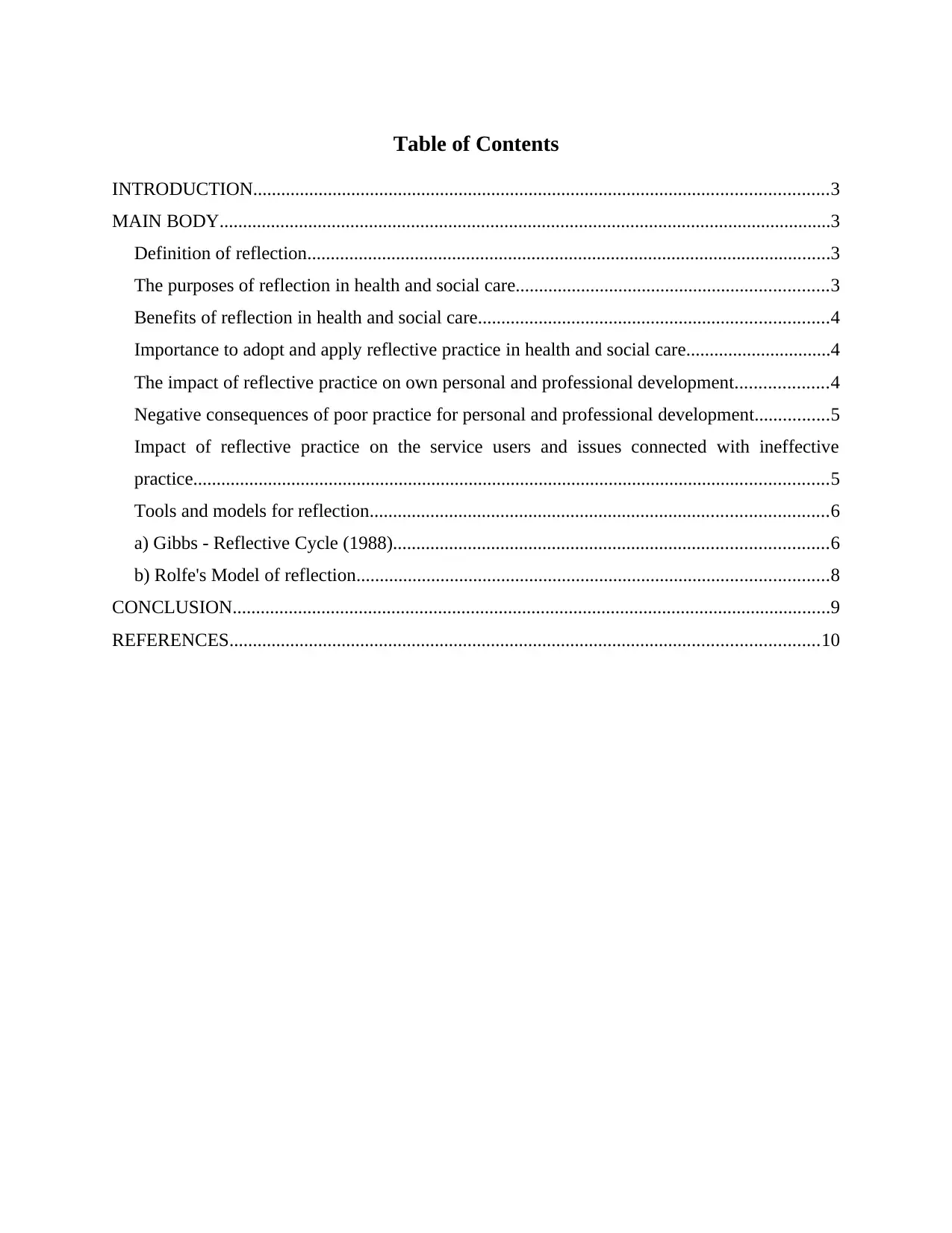
Table of Contents
INTRODUCTION...........................................................................................................................3
MAIN BODY...................................................................................................................................3
Definition of reflection................................................................................................................3
The purposes of reflection in health and social care...................................................................3
Benefits of reflection in health and social care...........................................................................4
Importance to adopt and apply reflective practice in health and social care...............................4
The impact of reflective practice on own personal and professional development....................4
Negative consequences of poor practice for personal and professional development................5
Impact of reflective practice on the service users and issues connected with ineffective
practice........................................................................................................................................5
Tools and models for reflection..................................................................................................6
a) Gibbs - Reflective Cycle (1988).............................................................................................6
b) Rolfe's Model of reflection.....................................................................................................8
CONCLUSION................................................................................................................................9
REFERENCES..............................................................................................................................10
INTRODUCTION...........................................................................................................................3
MAIN BODY...................................................................................................................................3
Definition of reflection................................................................................................................3
The purposes of reflection in health and social care...................................................................3
Benefits of reflection in health and social care...........................................................................4
Importance to adopt and apply reflective practice in health and social care...............................4
The impact of reflective practice on own personal and professional development....................4
Negative consequences of poor practice for personal and professional development................5
Impact of reflective practice on the service users and issues connected with ineffective
practice........................................................................................................................................5
Tools and models for reflection..................................................................................................6
a) Gibbs - Reflective Cycle (1988).............................................................................................6
b) Rolfe's Model of reflection.....................................................................................................8
CONCLUSION................................................................................................................................9
REFERENCES..............................................................................................................................10
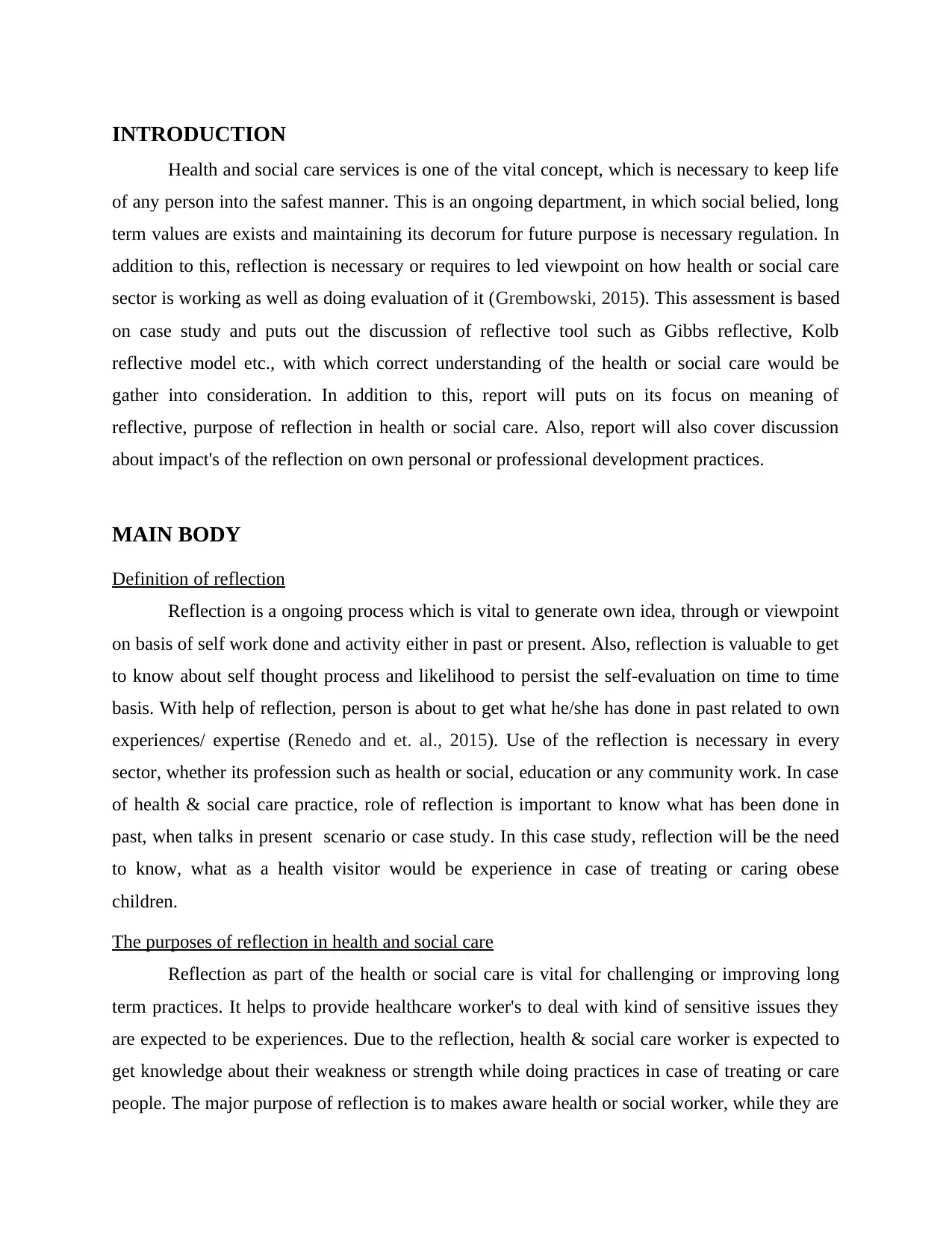
INTRODUCTION
Health and social care services is one of the vital concept, which is necessary to keep life
of any person into the safest manner. This is an ongoing department, in which social belied, long
term values are exists and maintaining its decorum for future purpose is necessary regulation. In
addition to this, reflection is necessary or requires to led viewpoint on how health or social care
sector is working as well as doing evaluation of it (Grembowski, 2015). This assessment is based
on case study and puts out the discussion of reflective tool such as Gibbs reflective, Kolb
reflective model etc., with which correct understanding of the health or social care would be
gather into consideration. In addition to this, report will puts on its focus on meaning of
reflective, purpose of reflection in health or social care. Also, report will also cover discussion
about impact's of the reflection on own personal or professional development practices.
MAIN BODY
Definition of reflection
Reflection is a ongoing process which is vital to generate own idea, through or viewpoint
on basis of self work done and activity either in past or present. Also, reflection is valuable to get
to know about self thought process and likelihood to persist the self-evaluation on time to time
basis. With help of reflection, person is about to get what he/she has done in past related to own
experiences/ expertise (Renedo and et. al., 2015). Use of the reflection is necessary in every
sector, whether its profession such as health or social, education or any community work. In case
of health & social care practice, role of reflection is important to know what has been done in
past, when talks in present scenario or case study. In this case study, reflection will be the need
to know, what as a health visitor would be experience in case of treating or caring obese
children.
The purposes of reflection in health and social care
Reflection as part of the health or social care is vital for challenging or improving long
term practices. It helps to provide healthcare worker's to deal with kind of sensitive issues they
are expected to be experiences. Due to the reflection, health & social care worker is expected to
get knowledge about their weakness or strength while doing practices in case of treating or care
people. The major purpose of reflection is to makes aware health or social worker, while they are
Health and social care services is one of the vital concept, which is necessary to keep life
of any person into the safest manner. This is an ongoing department, in which social belied, long
term values are exists and maintaining its decorum for future purpose is necessary regulation. In
addition to this, reflection is necessary or requires to led viewpoint on how health or social care
sector is working as well as doing evaluation of it (Grembowski, 2015). This assessment is based
on case study and puts out the discussion of reflective tool such as Gibbs reflective, Kolb
reflective model etc., with which correct understanding of the health or social care would be
gather into consideration. In addition to this, report will puts on its focus on meaning of
reflective, purpose of reflection in health or social care. Also, report will also cover discussion
about impact's of the reflection on own personal or professional development practices.
MAIN BODY
Definition of reflection
Reflection is a ongoing process which is vital to generate own idea, through or viewpoint
on basis of self work done and activity either in past or present. Also, reflection is valuable to get
to know about self thought process and likelihood to persist the self-evaluation on time to time
basis. With help of reflection, person is about to get what he/she has done in past related to own
experiences/ expertise (Renedo and et. al., 2015). Use of the reflection is necessary in every
sector, whether its profession such as health or social, education or any community work. In case
of health & social care practice, role of reflection is important to know what has been done in
past, when talks in present scenario or case study. In this case study, reflection will be the need
to know, what as a health visitor would be experience in case of treating or caring obese
children.
The purposes of reflection in health and social care
Reflection as part of the health or social care is vital for challenging or improving long
term practices. It helps to provide healthcare worker's to deal with kind of sensitive issues they
are expected to be experiences. Due to the reflection, health & social care worker is expected to
get knowledge about their weakness or strength while doing practices in case of treating or care
people. The major purpose of reflection is to makes aware health or social worker, while they are
⊘ This is a preview!⊘
Do you want full access?
Subscribe today to unlock all pages.

Trusted by 1+ million students worldwide
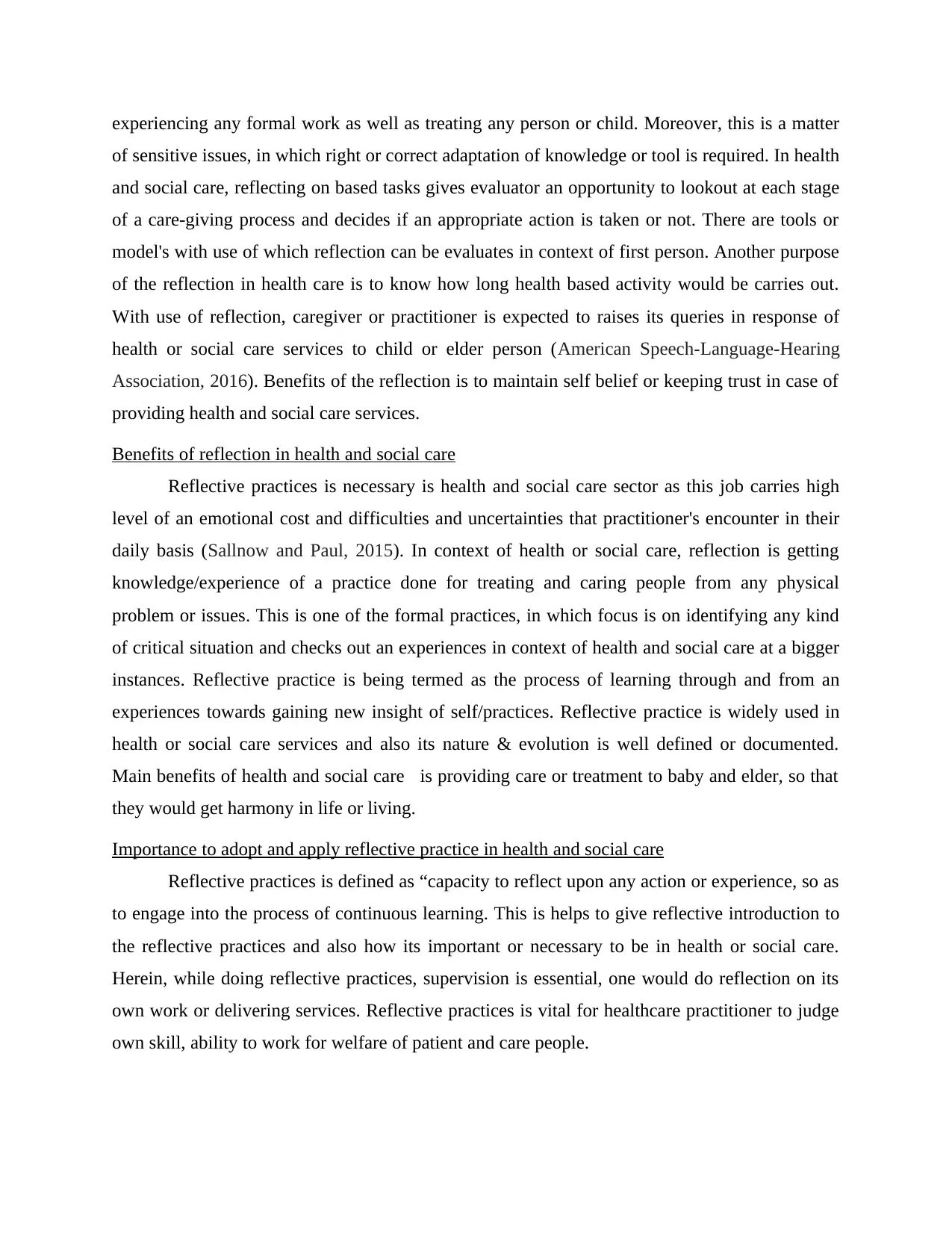
experiencing any formal work as well as treating any person or child. Moreover, this is a matter
of sensitive issues, in which right or correct adaptation of knowledge or tool is required. In health
and social care, reflecting on based tasks gives evaluator an opportunity to lookout at each stage
of a care-giving process and decides if an appropriate action is taken or not. There are tools or
model's with use of which reflection can be evaluates in context of first person. Another purpose
of the reflection in health care is to know how long health based activity would be carries out.
With use of reflection, caregiver or practitioner is expected to raises its queries in response of
health or social care services to child or elder person (American Speech-Language-Hearing
Association, 2016). Benefits of the reflection is to maintain self belief or keeping trust in case of
providing health and social care services.
Benefits of reflection in health and social care
Reflective practices is necessary is health and social care sector as this job carries high
level of an emotional cost and difficulties and uncertainties that practitioner's encounter in their
daily basis (Sallnow and Paul, 2015). In context of health or social care, reflection is getting
knowledge/experience of a practice done for treating and caring people from any physical
problem or issues. This is one of the formal practices, in which focus is on identifying any kind
of critical situation and checks out an experiences in context of health and social care at a bigger
instances. Reflective practice is being termed as the process of learning through and from an
experiences towards gaining new insight of self/practices. Reflective practice is widely used in
health or social care services and also its nature & evolution is well defined or documented.
Main benefits of health and social care is providing care or treatment to baby and elder, so that
they would get harmony in life or living.
Importance to adopt and apply reflective practice in health and social care
Reflective practices is defined as “capacity to reflect upon any action or experience, so as
to engage into the process of continuous learning. This is helps to give reflective introduction to
the reflective practices and also how its important or necessary to be in health or social care.
Herein, while doing reflective practices, supervision is essential, one would do reflection on its
own work or delivering services. Reflective practices is vital for healthcare practitioner to judge
own skill, ability to work for welfare of patient and care people.
of sensitive issues, in which right or correct adaptation of knowledge or tool is required. In health
and social care, reflecting on based tasks gives evaluator an opportunity to lookout at each stage
of a care-giving process and decides if an appropriate action is taken or not. There are tools or
model's with use of which reflection can be evaluates in context of first person. Another purpose
of the reflection in health care is to know how long health based activity would be carries out.
With use of reflection, caregiver or practitioner is expected to raises its queries in response of
health or social care services to child or elder person (American Speech-Language-Hearing
Association, 2016). Benefits of the reflection is to maintain self belief or keeping trust in case of
providing health and social care services.
Benefits of reflection in health and social care
Reflective practices is necessary is health and social care sector as this job carries high
level of an emotional cost and difficulties and uncertainties that practitioner's encounter in their
daily basis (Sallnow and Paul, 2015). In context of health or social care, reflection is getting
knowledge/experience of a practice done for treating and caring people from any physical
problem or issues. This is one of the formal practices, in which focus is on identifying any kind
of critical situation and checks out an experiences in context of health and social care at a bigger
instances. Reflective practice is being termed as the process of learning through and from an
experiences towards gaining new insight of self/practices. Reflective practice is widely used in
health or social care services and also its nature & evolution is well defined or documented.
Main benefits of health and social care is providing care or treatment to baby and elder, so that
they would get harmony in life or living.
Importance to adopt and apply reflective practice in health and social care
Reflective practices is defined as “capacity to reflect upon any action or experience, so as
to engage into the process of continuous learning. This is helps to give reflective introduction to
the reflective practices and also how its important or necessary to be in health or social care.
Herein, while doing reflective practices, supervision is essential, one would do reflection on its
own work or delivering services. Reflective practices is vital for healthcare practitioner to judge
own skill, ability to work for welfare of patient and care people.
Paraphrase This Document
Need a fresh take? Get an instant paraphrase of this document with our AI Paraphraser
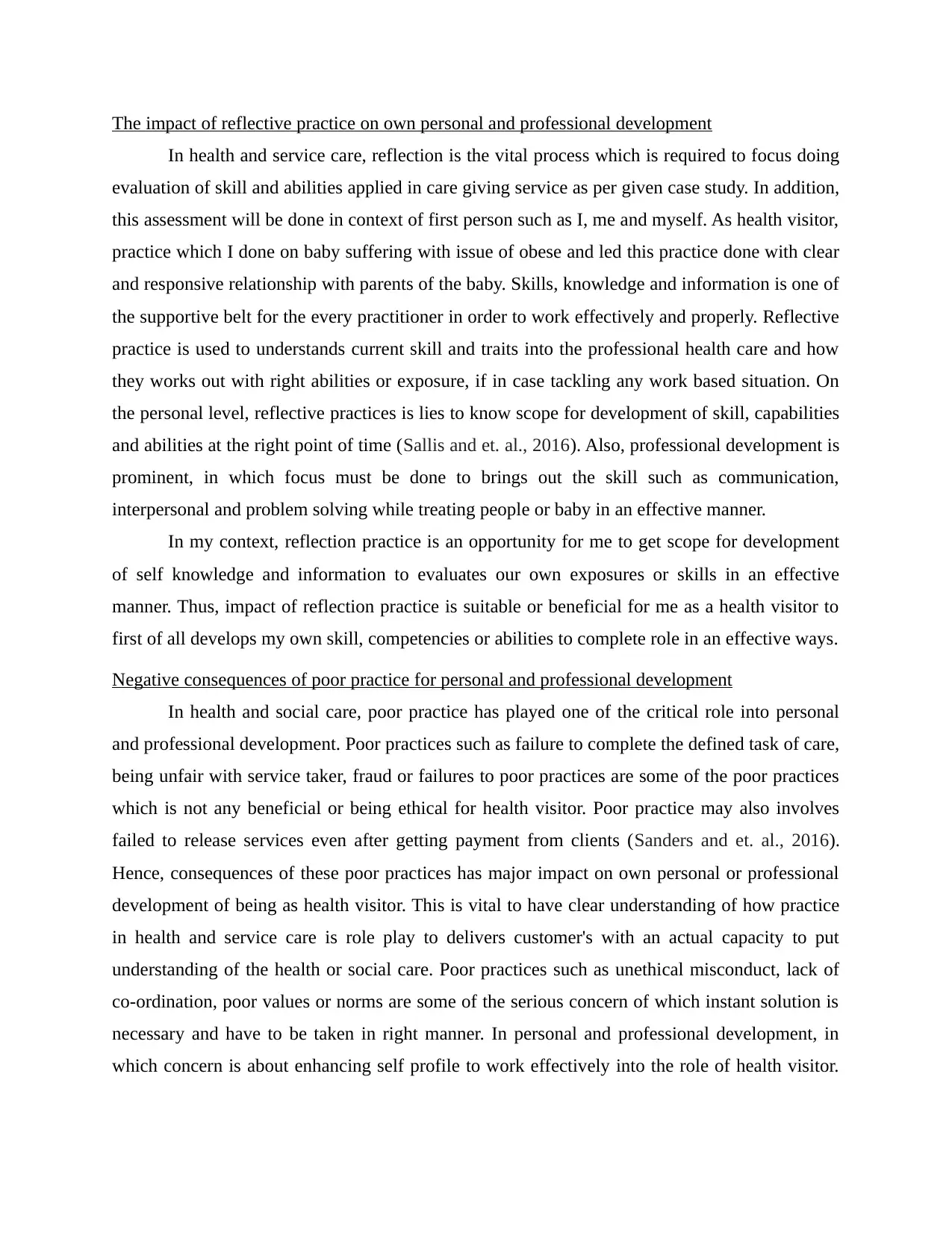
The impact of reflective practice on own personal and professional development
In health and service care, reflection is the vital process which is required to focus doing
evaluation of skill and abilities applied in care giving service as per given case study. In addition,
this assessment will be done in context of first person such as I, me and myself. As health visitor,
practice which I done on baby suffering with issue of obese and led this practice done with clear
and responsive relationship with parents of the baby. Skills, knowledge and information is one of
the supportive belt for the every practitioner in order to work effectively and properly. Reflective
practice is used to understands current skill and traits into the professional health care and how
they works out with right abilities or exposure, if in case tackling any work based situation. On
the personal level, reflective practices is lies to know scope for development of skill, capabilities
and abilities at the right point of time (Sallis and et. al., 2016). Also, professional development is
prominent, in which focus must be done to brings out the skill such as communication,
interpersonal and problem solving while treating people or baby in an effective manner.
In my context, reflection practice is an opportunity for me to get scope for development
of self knowledge and information to evaluates our own exposures or skills in an effective
manner. Thus, impact of reflection practice is suitable or beneficial for me as a health visitor to
first of all develops my own skill, competencies or abilities to complete role in an effective ways.
Negative consequences of poor practice for personal and professional development
In health and social care, poor practice has played one of the critical role into personal
and professional development. Poor practices such as failure to complete the defined task of care,
being unfair with service taker, fraud or failures to poor practices are some of the poor practices
which is not any beneficial or being ethical for health visitor. Poor practice may also involves
failed to release services even after getting payment from clients (Sanders and et. al., 2016).
Hence, consequences of these poor practices has major impact on own personal or professional
development of being as health visitor. This is vital to have clear understanding of how practice
in health and service care is role play to delivers customer's with an actual capacity to put
understanding of the health or social care. Poor practices such as unethical misconduct, lack of
co-ordination, poor values or norms are some of the serious concern of which instant solution is
necessary and have to be taken in right manner. In personal and professional development, in
which concern is about enhancing self profile to work effectively into the role of health visitor.
In health and service care, reflection is the vital process which is required to focus doing
evaluation of skill and abilities applied in care giving service as per given case study. In addition,
this assessment will be done in context of first person such as I, me and myself. As health visitor,
practice which I done on baby suffering with issue of obese and led this practice done with clear
and responsive relationship with parents of the baby. Skills, knowledge and information is one of
the supportive belt for the every practitioner in order to work effectively and properly. Reflective
practice is used to understands current skill and traits into the professional health care and how
they works out with right abilities or exposure, if in case tackling any work based situation. On
the personal level, reflective practices is lies to know scope for development of skill, capabilities
and abilities at the right point of time (Sallis and et. al., 2016). Also, professional development is
prominent, in which focus must be done to brings out the skill such as communication,
interpersonal and problem solving while treating people or baby in an effective manner.
In my context, reflection practice is an opportunity for me to get scope for development
of self knowledge and information to evaluates our own exposures or skills in an effective
manner. Thus, impact of reflection practice is suitable or beneficial for me as a health visitor to
first of all develops my own skill, competencies or abilities to complete role in an effective ways.
Negative consequences of poor practice for personal and professional development
In health and social care, poor practice has played one of the critical role into personal
and professional development. Poor practices such as failure to complete the defined task of care,
being unfair with service taker, fraud or failures to poor practices are some of the poor practices
which is not any beneficial or being ethical for health visitor. Poor practice may also involves
failed to release services even after getting payment from clients (Sanders and et. al., 2016).
Hence, consequences of these poor practices has major impact on own personal or professional
development of being as health visitor. This is vital to have clear understanding of how practice
in health and service care is role play to delivers customer's with an actual capacity to put
understanding of the health or social care. Poor practices such as unethical misconduct, lack of
co-ordination, poor values or norms are some of the serious concern of which instant solution is
necessary and have to be taken in right manner. In personal and professional development, in
which concern is about enhancing self profile to work effectively into the role of health visitor.
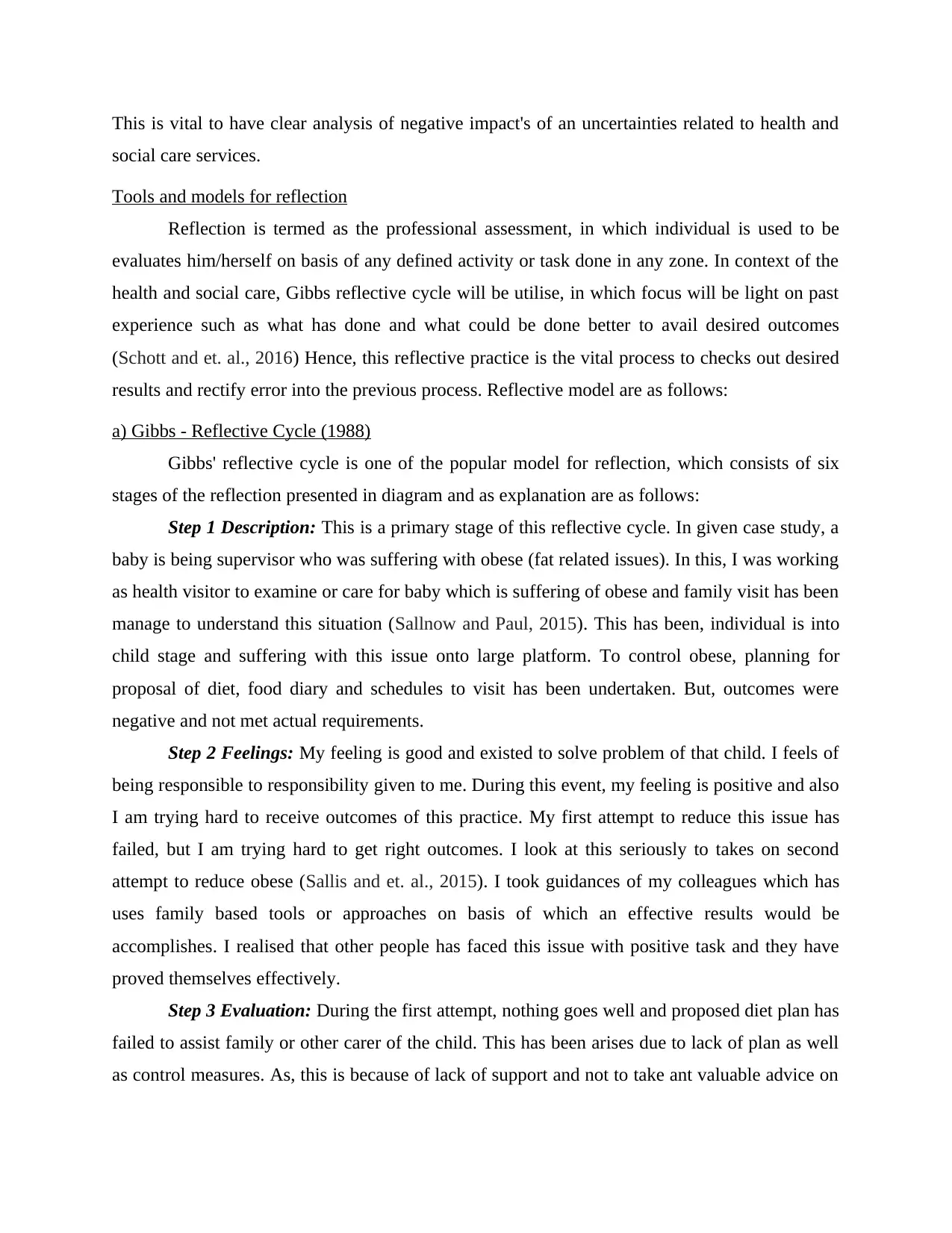
This is vital to have clear analysis of negative impact's of an uncertainties related to health and
social care services.
Tools and models for reflection
Reflection is termed as the professional assessment, in which individual is used to be
evaluates him/herself on basis of any defined activity or task done in any zone. In context of the
health and social care, Gibbs reflective cycle will be utilise, in which focus will be light on past
experience such as what has done and what could be done better to avail desired outcomes
(Schott and et. al., 2016) Hence, this reflective practice is the vital process to checks out desired
results and rectify error into the previous process. Reflective model are as follows:
a) Gibbs - Reflective Cycle (1988)
Gibbs' reflective cycle is one of the popular model for reflection, which consists of six
stages of the reflection presented in diagram and as explanation are as follows:
Step 1 Description: This is a primary stage of this reflective cycle. In given case study, a
baby is being supervisor who was suffering with obese (fat related issues). In this, I was working
as health visitor to examine or care for baby which is suffering of obese and family visit has been
manage to understand this situation (Sallnow and Paul, 2015). This has been, individual is into
child stage and suffering with this issue onto large platform. To control obese, planning for
proposal of diet, food diary and schedules to visit has been undertaken. But, outcomes were
negative and not met actual requirements.
Step 2 Feelings: My feeling is good and existed to solve problem of that child. I feels of
being responsible to responsibility given to me. During this event, my feeling is positive and also
I am trying hard to receive outcomes of this practice. My first attempt to reduce this issue has
failed, but I am trying hard to get right outcomes. I look at this seriously to takes on second
attempt to reduce obese (Sallis and et. al., 2015). I took guidances of my colleagues which has
uses family based tools or approaches on basis of which an effective results would be
accomplishes. I realised that other people has faced this issue with positive task and they have
proved themselves effectively.
Step 3 Evaluation: During the first attempt, nothing goes well and proposed diet plan has
failed to assist family or other carer of the child. This has been arises due to lack of plan as well
as control measures. As, this is because of lack of support and not to take ant valuable advice on
social care services.
Tools and models for reflection
Reflection is termed as the professional assessment, in which individual is used to be
evaluates him/herself on basis of any defined activity or task done in any zone. In context of the
health and social care, Gibbs reflective cycle will be utilise, in which focus will be light on past
experience such as what has done and what could be done better to avail desired outcomes
(Schott and et. al., 2016) Hence, this reflective practice is the vital process to checks out desired
results and rectify error into the previous process. Reflective model are as follows:
a) Gibbs - Reflective Cycle (1988)
Gibbs' reflective cycle is one of the popular model for reflection, which consists of six
stages of the reflection presented in diagram and as explanation are as follows:
Step 1 Description: This is a primary stage of this reflective cycle. In given case study, a
baby is being supervisor who was suffering with obese (fat related issues). In this, I was working
as health visitor to examine or care for baby which is suffering of obese and family visit has been
manage to understand this situation (Sallnow and Paul, 2015). This has been, individual is into
child stage and suffering with this issue onto large platform. To control obese, planning for
proposal of diet, food diary and schedules to visit has been undertaken. But, outcomes were
negative and not met actual requirements.
Step 2 Feelings: My feeling is good and existed to solve problem of that child. I feels of
being responsible to responsibility given to me. During this event, my feeling is positive and also
I am trying hard to receive outcomes of this practice. My first attempt to reduce this issue has
failed, but I am trying hard to get right outcomes. I look at this seriously to takes on second
attempt to reduce obese (Sallis and et. al., 2015). I took guidances of my colleagues which has
uses family based tools or approaches on basis of which an effective results would be
accomplishes. I realised that other people has faced this issue with positive task and they have
proved themselves effectively.
Step 3 Evaluation: During the first attempt, nothing goes well and proposed diet plan has
failed to assist family or other carer of the child. This has been arises due to lack of plan as well
as control measures. As, this is because of lack of support and not to take ant valuable advice on
⊘ This is a preview!⊘
Do you want full access?
Subscribe today to unlock all pages.

Trusted by 1+ million students worldwide
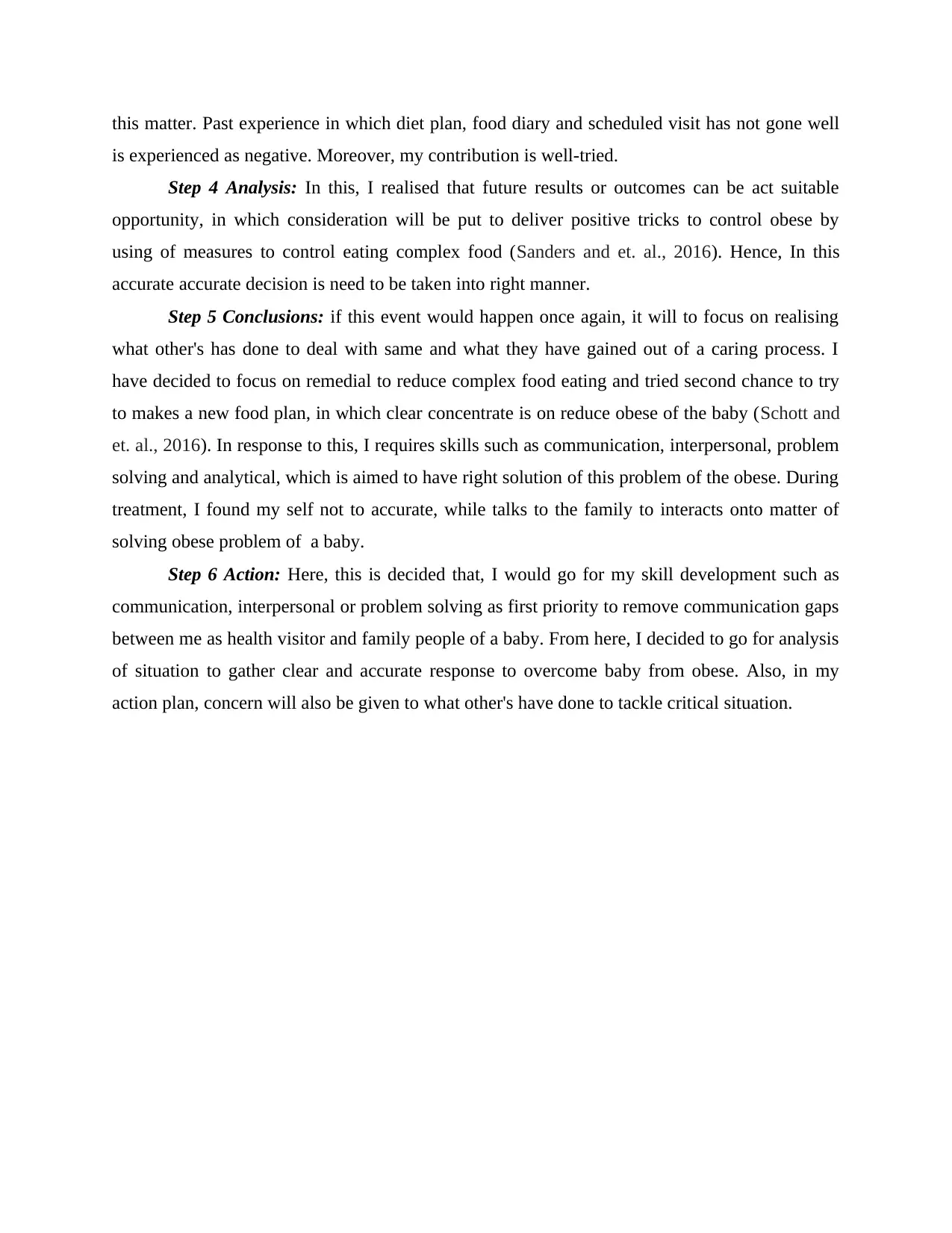
this matter. Past experience in which diet plan, food diary and scheduled visit has not gone well
is experienced as negative. Moreover, my contribution is well-tried.
Step 4 Analysis: In this, I realised that future results or outcomes can be act suitable
opportunity, in which consideration will be put to deliver positive tricks to control obese by
using of measures to control eating complex food (Sanders and et. al., 2016). Hence, In this
accurate accurate decision is need to be taken into right manner.
Step 5 Conclusions: if this event would happen once again, it will to focus on realising
what other's has done to deal with same and what they have gained out of a caring process. I
have decided to focus on remedial to reduce complex food eating and tried second chance to try
to makes a new food plan, in which clear concentrate is on reduce obese of the baby (Schott and
et. al., 2016). In response to this, I requires skills such as communication, interpersonal, problem
solving and analytical, which is aimed to have right solution of this problem of the obese. During
treatment, I found my self not to accurate, while talks to the family to interacts onto matter of
solving obese problem of a baby.
Step 6 Action: Here, this is decided that, I would go for my skill development such as
communication, interpersonal or problem solving as first priority to remove communication gaps
between me as health visitor and family people of a baby. From here, I decided to go for analysis
of situation to gather clear and accurate response to overcome baby from obese. Also, in my
action plan, concern will also be given to what other's have done to tackle critical situation.
is experienced as negative. Moreover, my contribution is well-tried.
Step 4 Analysis: In this, I realised that future results or outcomes can be act suitable
opportunity, in which consideration will be put to deliver positive tricks to control obese by
using of measures to control eating complex food (Sanders and et. al., 2016). Hence, In this
accurate accurate decision is need to be taken into right manner.
Step 5 Conclusions: if this event would happen once again, it will to focus on realising
what other's has done to deal with same and what they have gained out of a caring process. I
have decided to focus on remedial to reduce complex food eating and tried second chance to try
to makes a new food plan, in which clear concentrate is on reduce obese of the baby (Schott and
et. al., 2016). In response to this, I requires skills such as communication, interpersonal, problem
solving and analytical, which is aimed to have right solution of this problem of the obese. During
treatment, I found my self not to accurate, while talks to the family to interacts onto matter of
solving obese problem of a baby.
Step 6 Action: Here, this is decided that, I would go for my skill development such as
communication, interpersonal or problem solving as first priority to remove communication gaps
between me as health visitor and family people of a baby. From here, I decided to go for analysis
of situation to gather clear and accurate response to overcome baby from obese. Also, in my
action plan, concern will also be given to what other's have done to tackle critical situation.
Paraphrase This Document
Need a fresh take? Get an instant paraphrase of this document with our AI Paraphraser
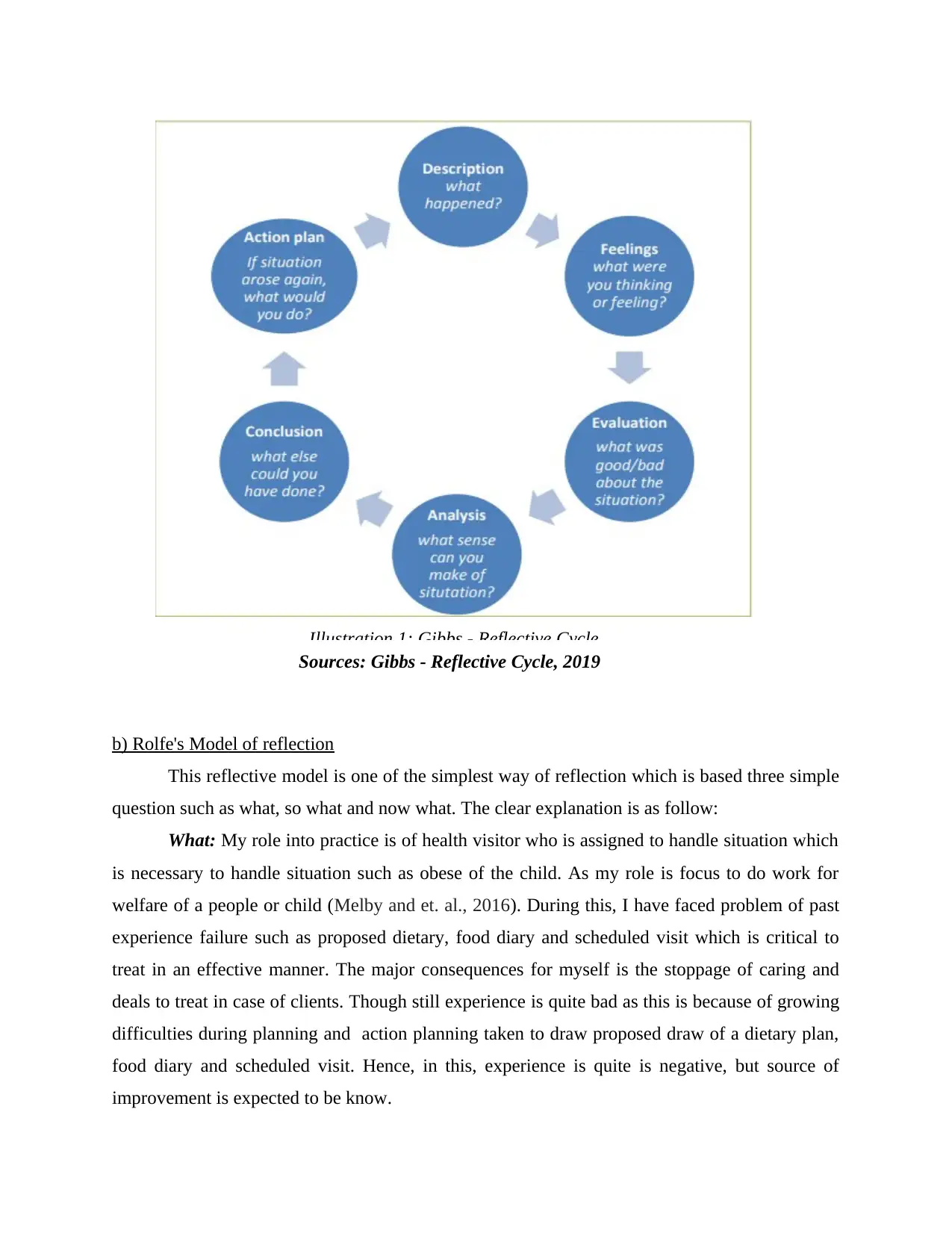
Sources: Gibbs - Reflective Cycle, 2019
b) Rolfe's Model of reflection
This reflective model is one of the simplest way of reflection which is based three simple
question such as what, so what and now what. The clear explanation is as follow:
What: My role into practice is of health visitor who is assigned to handle situation which
is necessary to handle situation such as obese of the child. As my role is focus to do work for
welfare of a people or child (Melby and et. al., 2016). During this, I have faced problem of past
experience failure such as proposed dietary, food diary and scheduled visit which is critical to
treat in an effective manner. The major consequences for myself is the stoppage of caring and
deals to treat in case of clients. Though still experience is quite bad as this is because of growing
difficulties during planning and action planning taken to draw proposed draw of a dietary plan,
food diary and scheduled visit. Hence, in this, experience is quite is negative, but source of
improvement is expected to be know.
Illustration 1: Gibbs - Reflective Cycle
b) Rolfe's Model of reflection
This reflective model is one of the simplest way of reflection which is based three simple
question such as what, so what and now what. The clear explanation is as follow:
What: My role into practice is of health visitor who is assigned to handle situation which
is necessary to handle situation such as obese of the child. As my role is focus to do work for
welfare of a people or child (Melby and et. al., 2016). During this, I have faced problem of past
experience failure such as proposed dietary, food diary and scheduled visit which is critical to
treat in an effective manner. The major consequences for myself is the stoppage of caring and
deals to treat in case of clients. Though still experience is quite bad as this is because of growing
difficulties during planning and action planning taken to draw proposed draw of a dietary plan,
food diary and scheduled visit. Hence, in this, experience is quite is negative, but source of
improvement is expected to be know.
Illustration 1: Gibbs - Reflective Cycle
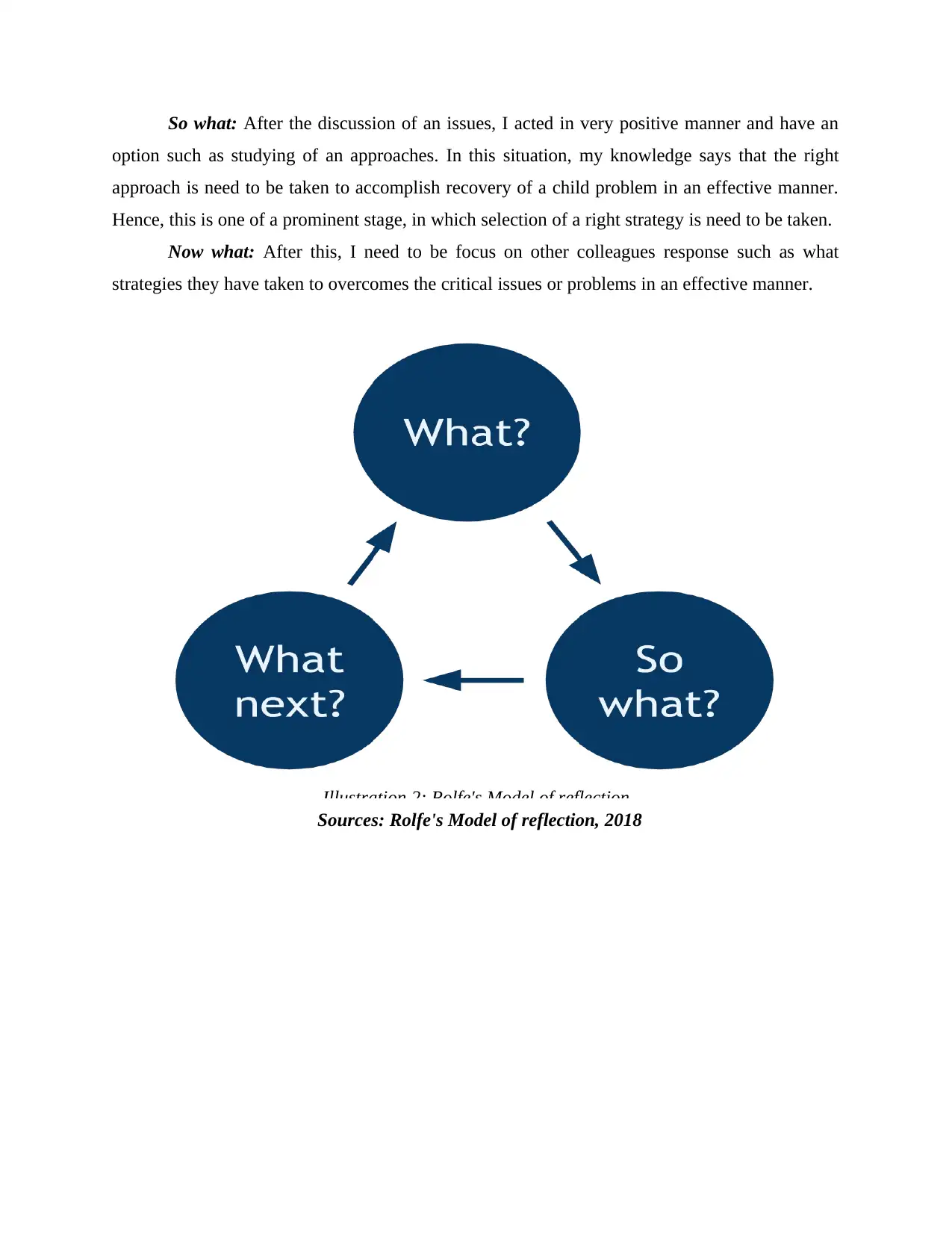
So what: After the discussion of an issues, I acted in very positive manner and have an
option such as studying of an approaches. In this situation, my knowledge says that the right
approach is need to be taken to accomplish recovery of a child problem in an effective manner.
Hence, this is one of a prominent stage, in which selection of a right strategy is need to be taken.
Now what: After this, I need to be focus on other colleagues response such as what
strategies they have taken to overcomes the critical issues or problems in an effective manner.
Sources: Rolfe's Model of reflection, 2018
Illustration 2: Rolfe's Model of reflection
option such as studying of an approaches. In this situation, my knowledge says that the right
approach is need to be taken to accomplish recovery of a child problem in an effective manner.
Hence, this is one of a prominent stage, in which selection of a right strategy is need to be taken.
Now what: After this, I need to be focus on other colleagues response such as what
strategies they have taken to overcomes the critical issues or problems in an effective manner.
Sources: Rolfe's Model of reflection, 2018
Illustration 2: Rolfe's Model of reflection
⊘ This is a preview!⊘
Do you want full access?
Subscribe today to unlock all pages.

Trusted by 1+ million students worldwide
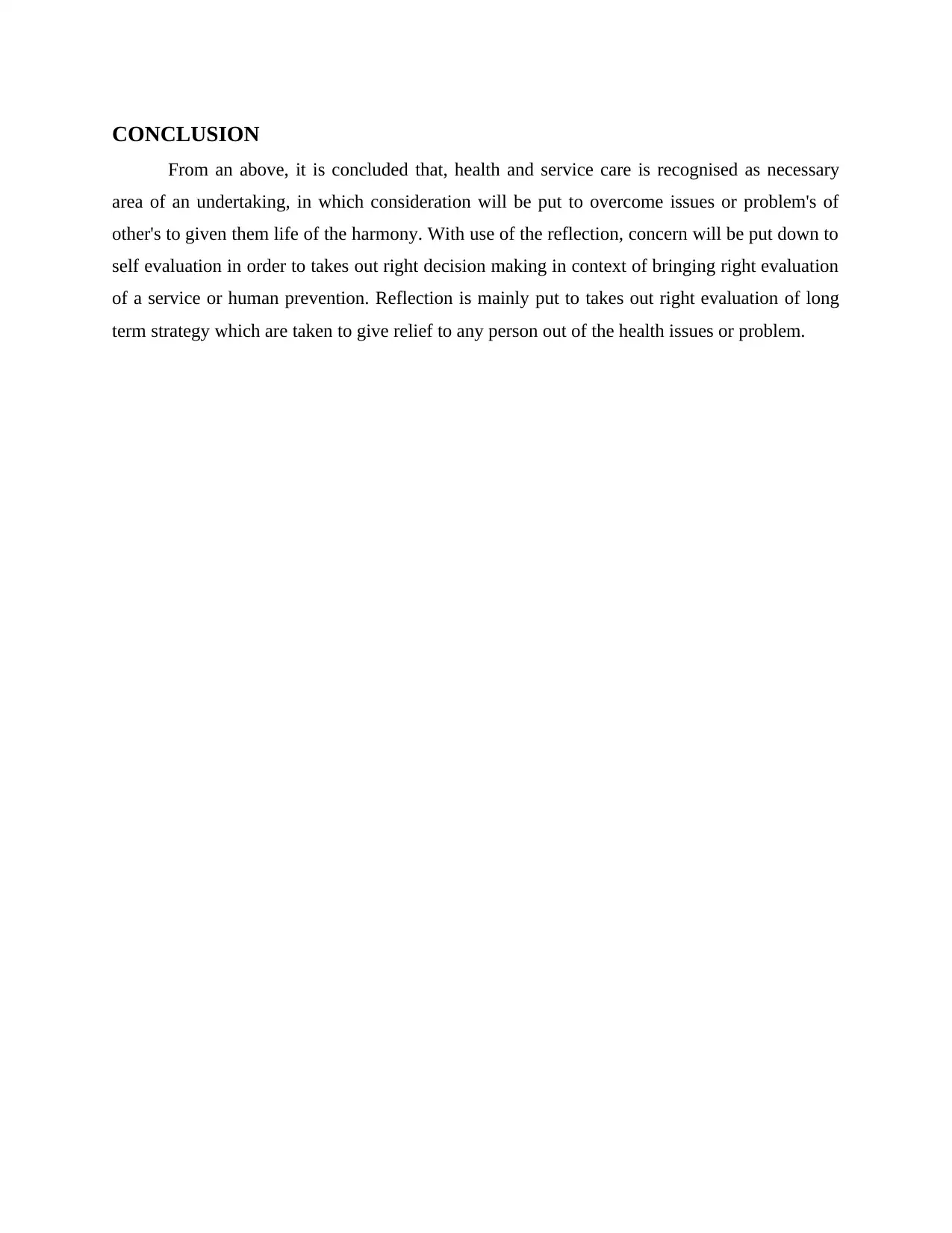
CONCLUSION
From an above, it is concluded that, health and service care is recognised as necessary
area of an undertaking, in which consideration will be put to overcome issues or problem's of
other's to given them life of the harmony. With use of the reflection, concern will be put down to
self evaluation in order to takes out right decision making in context of bringing right evaluation
of a service or human prevention. Reflection is mainly put to takes out right evaluation of long
term strategy which are taken to give relief to any person out of the health issues or problem.
From an above, it is concluded that, health and service care is recognised as necessary
area of an undertaking, in which consideration will be put to overcome issues or problem's of
other's to given them life of the harmony. With use of the reflection, concern will be put down to
self evaluation in order to takes out right decision making in context of bringing right evaluation
of a service or human prevention. Reflection is mainly put to takes out right evaluation of long
term strategy which are taken to give relief to any person out of the health issues or problem.
Paraphrase This Document
Need a fresh take? Get an instant paraphrase of this document with our AI Paraphraser
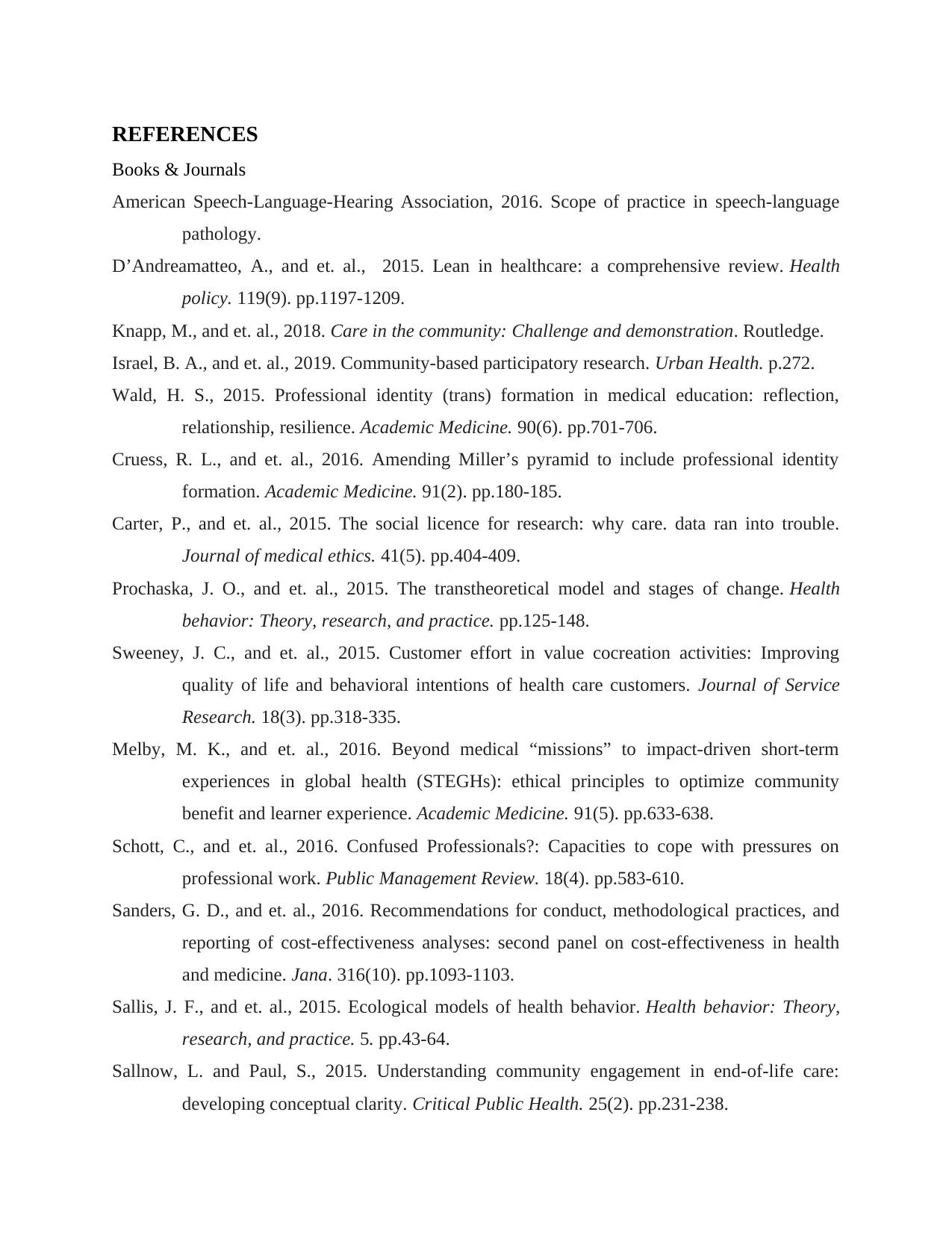
REFERENCES
Books & Journals
American Speech-Language-Hearing Association, 2016. Scope of practice in speech-language
pathology.
D’Andreamatteo, A., and et. al., 2015. Lean in healthcare: a comprehensive review. Health
policy. 119(9). pp.1197-1209.
Knapp, M., and et. al., 2018. Care in the community: Challenge and demonstration. Routledge.
Israel, B. A., and et. al., 2019. Community-based participatory research. Urban Health. p.272.
Wald, H. S., 2015. Professional identity (trans) formation in medical education: reflection,
relationship, resilience. Academic Medicine. 90(6). pp.701-706.
Cruess, R. L., and et. al., 2016. Amending Miller’s pyramid to include professional identity
formation. Academic Medicine. 91(2). pp.180-185.
Carter, P., and et. al., 2015. The social licence for research: why care. data ran into trouble.
Journal of medical ethics. 41(5). pp.404-409.
Prochaska, J. O., and et. al., 2015. The transtheoretical model and stages of change. Health
behavior: Theory, research, and practice. pp.125-148.
Sweeney, J. C., and et. al., 2015. Customer effort in value cocreation activities: Improving
quality of life and behavioral intentions of health care customers. Journal of Service
Research. 18(3). pp.318-335.
Melby, M. K., and et. al., 2016. Beyond medical “missions” to impact-driven short-term
experiences in global health (STEGHs): ethical principles to optimize community
benefit and learner experience. Academic Medicine. 91(5). pp.633-638.
Schott, C., and et. al., 2016. Confused Professionals?: Capacities to cope with pressures on
professional work. Public Management Review. 18(4). pp.583-610.
Sanders, G. D., and et. al., 2016. Recommendations for conduct, methodological practices, and
reporting of cost-effectiveness analyses: second panel on cost-effectiveness in health
and medicine. Jana. 316(10). pp.1093-1103.
Sallis, J. F., and et. al., 2015. Ecological models of health behavior. Health behavior: Theory,
research, and practice. 5. pp.43-64.
Sallnow, L. and Paul, S., 2015. Understanding community engagement in end-of-life care:
developing conceptual clarity. Critical Public Health. 25(2). pp.231-238.
Books & Journals
American Speech-Language-Hearing Association, 2016. Scope of practice in speech-language
pathology.
D’Andreamatteo, A., and et. al., 2015. Lean in healthcare: a comprehensive review. Health
policy. 119(9). pp.1197-1209.
Knapp, M., and et. al., 2018. Care in the community: Challenge and demonstration. Routledge.
Israel, B. A., and et. al., 2019. Community-based participatory research. Urban Health. p.272.
Wald, H. S., 2015. Professional identity (trans) formation in medical education: reflection,
relationship, resilience. Academic Medicine. 90(6). pp.701-706.
Cruess, R. L., and et. al., 2016. Amending Miller’s pyramid to include professional identity
formation. Academic Medicine. 91(2). pp.180-185.
Carter, P., and et. al., 2015. The social licence for research: why care. data ran into trouble.
Journal of medical ethics. 41(5). pp.404-409.
Prochaska, J. O., and et. al., 2015. The transtheoretical model and stages of change. Health
behavior: Theory, research, and practice. pp.125-148.
Sweeney, J. C., and et. al., 2015. Customer effort in value cocreation activities: Improving
quality of life and behavioral intentions of health care customers. Journal of Service
Research. 18(3). pp.318-335.
Melby, M. K., and et. al., 2016. Beyond medical “missions” to impact-driven short-term
experiences in global health (STEGHs): ethical principles to optimize community
benefit and learner experience. Academic Medicine. 91(5). pp.633-638.
Schott, C., and et. al., 2016. Confused Professionals?: Capacities to cope with pressures on
professional work. Public Management Review. 18(4). pp.583-610.
Sanders, G. D., and et. al., 2016. Recommendations for conduct, methodological practices, and
reporting of cost-effectiveness analyses: second panel on cost-effectiveness in health
and medicine. Jana. 316(10). pp.1093-1103.
Sallis, J. F., and et. al., 2015. Ecological models of health behavior. Health behavior: Theory,
research, and practice. 5. pp.43-64.
Sallnow, L. and Paul, S., 2015. Understanding community engagement in end-of-life care:
developing conceptual clarity. Critical Public Health. 25(2). pp.231-238.
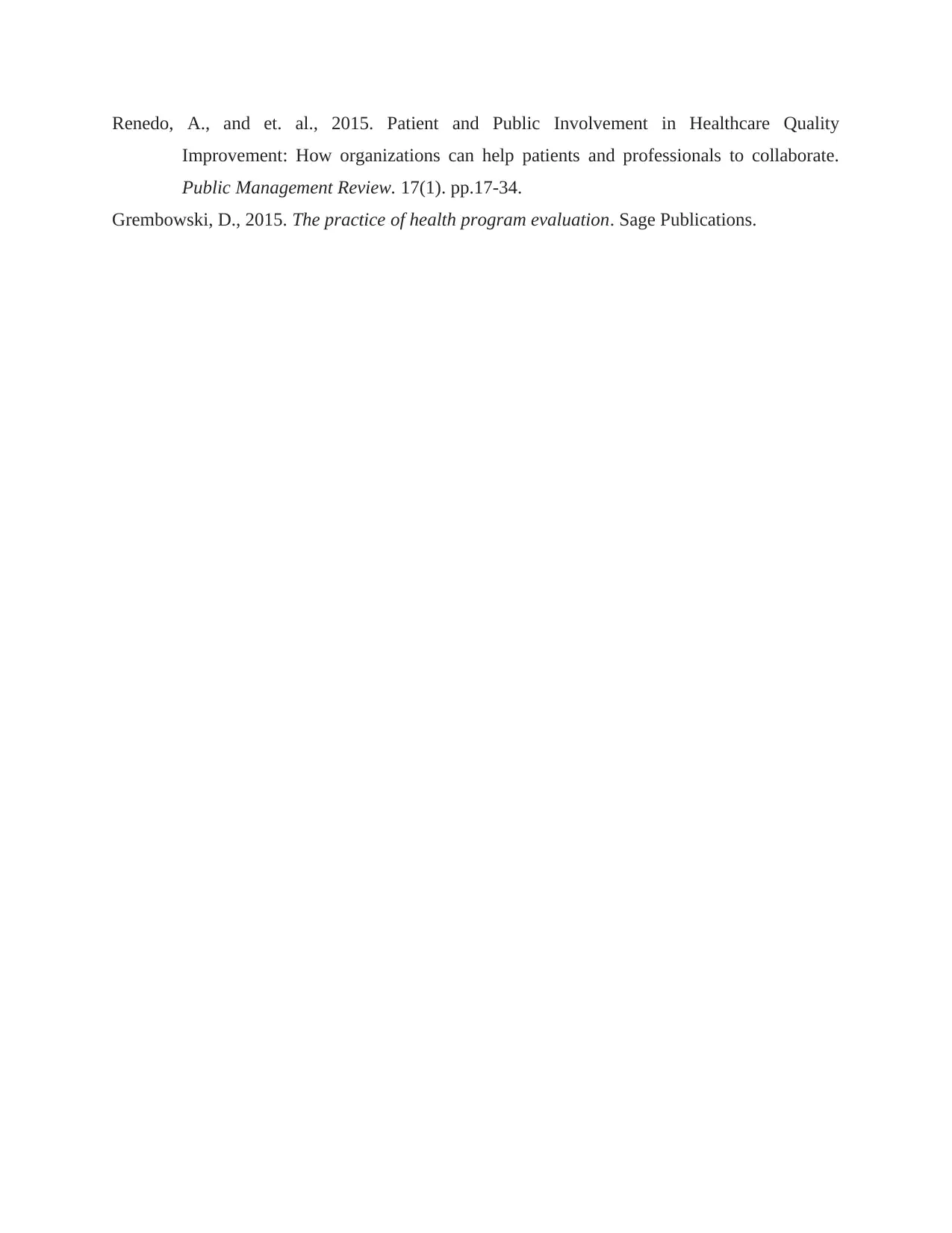
Renedo, A., and et. al., 2015. Patient and Public Involvement in Healthcare Quality
Improvement: How organizations can help patients and professionals to collaborate.
Public Management Review. 17(1). pp.17-34.
Grembowski, D., 2015. The practice of health program evaluation. Sage Publications.
Improvement: How organizations can help patients and professionals to collaborate.
Public Management Review. 17(1). pp.17-34.
Grembowski, D., 2015. The practice of health program evaluation. Sage Publications.
⊘ This is a preview!⊘
Do you want full access?
Subscribe today to unlock all pages.

Trusted by 1+ million students worldwide
1 out of 12
Related Documents
Your All-in-One AI-Powered Toolkit for Academic Success.
+13062052269
info@desklib.com
Available 24*7 on WhatsApp / Email
![[object Object]](/_next/static/media/star-bottom.7253800d.svg)
Unlock your academic potential
Copyright © 2020–2026 A2Z Services. All Rights Reserved. Developed and managed by ZUCOL.




